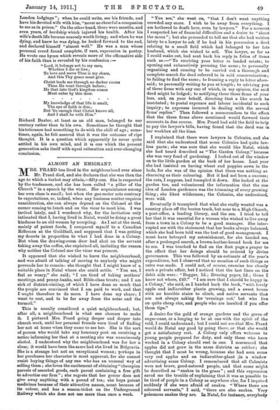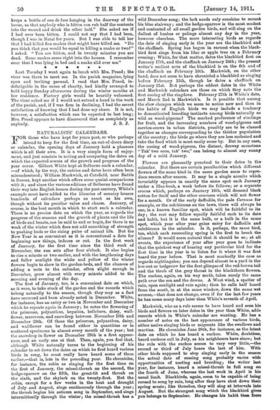ALMOST AN EMIGRANT.
MRS. PRAED has lived in the neighbourhood ever since Mr. Praed died, and she declares that she was then the age to which a turbot may attain,—fifty-one. She is respected by the tradesmen, and she has been called "a pillar of the Church" in a speech by the vicar. Her acquaintance among her own class is small; but when the gas-meter acts contrary to expectations, or, indeed, when any business matter requires consideration, she can always depend on the Colonel at the corner coming to lunch and on the vicar to meet him. I was invited lately, and I wondered why, for the invitation only intimated that I, having lived in Natal, would be doing a. great kindness to an old woman by accepting. As I sat at the meal, mainly of patent foods, I compared myself to a Canadian Rifleman at the Guildhall, and supposed that I was getting my deserts in proportion to what I had done in a Colony. But when the drawing-room door had shut on the servant taking away the coffee, she explained all, including the reason why neither the Colonel nor the vicar was present.
It appeared that she wished to leave the neighbourhood, and was afraid of talking of moving to anybody who might persuade her to remain: she thought that I might know of a suitable place in Natal where she could settle. " You see, I feel so weary," she said; "I am tired of taking mothers' meetings, and penny-banks, and Bible-class treats; and I am sick of district-visiting, of which I have done so much that the people are convinced that I am paid to work, and that Fought therefore to do more. I have done my share ; I want to rest, and to be far away from the noise and the turmoil."
This is usually considered a quiet neighbourhood; but, after all, a neighbourhood is what one chooses to make it. I pictured Mrs. Praed going deeper and deeper into church work, until her personal friends were tired of finding her not at home when they came to see her. She is the sort of person who would take any honorary post on receiving a notice informing her that at a meeting she was unanimously elected. I understood why the neighbourhood was for her a slum; it would have been the same had she lived in Belgravia. She is a strange but not an exceptional woman; perhaps in her purchases her character is most apparent, for she cannot resist buying things of any one who has an unusual way of selling them ; she loves the excitement of obtaining "champion parcels of assorted goods, each parcel containing a free gift to advertise our firm " ; she regrets that her grocer does not give away anything with a pound of tea; she buys patent medicines because of their attractive names, scent because of its colour, and has a season-ticket on the Underground Railway which she does not use more than once a week. "Yon see," she • went on, "that I don't want anything crowded any more. I wish to be away from everything. I am bothered to death here, even by lawyers." For a moment I suspected her of financial difficulties and a desire to " shoot the moon" ; but she proceeded to tell me that she had written lately to a lawyer to ask if he had in his possession a deed relating to a small field which had belonged to her late husband, which she wished to sell. The lawyer, so far as I could make out, had sent back his reply in folios of items such as :—" To receiving your letter re landed estate; to opening and exhaustively perusing the same ; to personally organising and causing to be carried out a thorough and complete search for deed referred to in said communication; to failing to find the same ; to framing a reply to letter afore- said; to personally writing to you at length ; to advising you of three firms with any one of which, in my opinion, the said deed might be lodged ; to notifying these three firms of your loss, and, on your behalf, directing that a like search be instituted ; to postal expenses and labour incidental to such inquiry; to • expenses incurred in dealing with the several firms' replies." Then followed a memorandum to the effect that the three firms above mentioned would forward their accounts in due course. Mrs. Praed had sold the field to help to pay the lawyer's -bills, having found that the deed was in her workbox all the time.
I explained that there were lawyers in Colonies, and she said that she understood that some Colonies had quite law- less parts ; she was sure that she would like Natal, which she had heard described as " The Garden Colony," because she was very fond of gardening. I looked out of the window on to the little garden at the back of her house. Last year she had insisted on having wheat and poppies sown in the beds, for she was of the opinion that there was nothing so charming as their colouring. But it had not been a success; the cats, I suppose, had trampled it down. She looked at the garden too, and volunteered the information that the one idea of London gardeners was the trimming of every growing thing ; she liked wilderness; the Colonies, she understood, were wild.
Eventually it transpired that what she really wanted was a country place off the beaten track, but near to a High Church, a post-office, a lending library, and the sea. I tried to tell her that it was essential for a woman who wished to live away from a town in a Colony to be a good manager. She inter- rupted me with the statement that her books always balanced, which she had been told was the test of good management. I must have betrayed my astonishment, for she handed me, after a prolonged search, a brown-leather-bound book for me to see. I was touched to find on the first page a prayer to the effect that her doings should be ordered by divine governance. This was followed by an estimate of the year's expenditure, but I observed that no mention of such things as rates was made. I could not, of course, examine too closely such a private affair, but I noticed that the last lines on the debit aide were : "Beggar, ld.; Evening paper, ld. ; Gone I know not where, 249." "I am sure that I should be happy in a Colony," she said, as I handed back the book, "with lovely apple and indiarubber plants growing, and a sweet house with no horrible stairs to climb, and native servants that are not always asking for 'evenings out,' but who live on quite cheap rice, and people who are insulted if you offer them tips."
A desire for the gold of orange gardens and the green of sugar-cane, or a longing to be at one with the spirit of the veld, I could understand ; but I could not see-that Mrs. Praed would do Natal any good by going there, or that she would get a satisfactory rest. A Colony only offers welcome to young people prepared for duty, and only those who have worked in a Colony should rest in one. I murmured that apples did not grow in the same districts as rubber ; she thought that I must be wrong, because she had seen some very red apples and an indiarubber-plant Lin a window advertising some Colony. I remembered that all Colonists were not brave, good-natured people, and that some might be described as "snakes in the grass " ; and this expression saved me the trouble of explaining that it was as possible to be tired of people in a Colony as anywhere else, for I inquired suddenly if she were afraid of snakes. " Where there are coloured servants," I said, " there are also snakes. Very poisonous snakes they are. In Natal, for instance, everybody keeps a bottle of eau de luxe hanging in the doorway of the house, so that anybody who is bitten can rub hall the contents into the wound and drink the other half." She asked me if I had ever been bitten. I could not say that I had been, though I was in Natal for years. But I was able to tell her that I had killed five snakes that might have killed me. "Do you think that you would be equal to killing a snake or two?" I asked. " You are bitten, and in twenty minutes you are dead. Some snakes come right into the houses. I remember once that I was lying in bed and a snake slid over me."
* • * a* * Last Tuesday I went again to lunch with Mrs. Praed; the vicar was there to meet me. In the parish magazine, lying open and inviting perusal, I read that Mrs. Praed, in- defatigable in the cause of charity, had kindly arranged to hold happy Sunday afternoons during the winter months at her residence. Factory girls would be heartily welcomed. The vicar asked me if I would not extend a hand in the work of the parish, and, if I was firm in declining, I had the secret satisfaction of knowing that I had done my share. It is not, however, a satisfaction which can be expected to last long; Mrs. Pined appears to have discovered that as completely as







































 Previous page
Previous page